Superfund Research Program
Congratulations to the 2023 winners of the K.C. Donnelly Externship Award!
Eric Brown
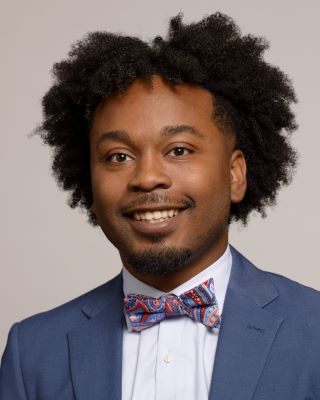
Eric Brown is a doctoral student at the University of North Carolina at Chapel Hill (UNC) under the mentorship of UNC SRP Center Director Rebecca Fry, Ph.D. For his externship, he will travel to the Harvard University Metals and Metal Mixtures, Cognitive Aging, Remediation and Exposure Sources (MEMCARE) Superfund Research Center to work with Brent Coull, Ph.D., who leads their Data Management and Analysis Core.
Brown’s research uses sophisticated approaches to investigate the mechanisms that underlie the association between exposure to complex chemical mixtures and adverse health outcomes across the life course. He characterizes these associations using approaches from multiple scientific fields including molecular epidemiology and computational biology. In particular, he is interested in how exposure to metals, individually or in mixtures, can lead to preterm birth. For his externship, he will learn different advanced statistical approaches for handling complex chemical mixtures. He will also explore the molecular drivers in the placenta involved in the effect of environmental metals on preterm birth.
“This externship will enhance my training in biostatistics to tackle complex mixtures, which is vital to my long-term research goal of developing mixtures modeling approaches that integrate environmental hazards and psychosocial stressors,” said Brown. “I’m also interested in exploring the association between upstream social determinants of health and differences in exposure to mixtures and other stressors.”
Asta Habtemichael
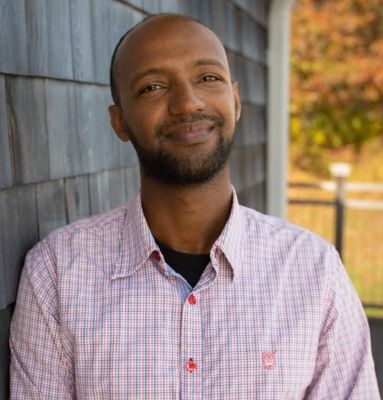
Asta Zerue Habtemichael is a doctoral candidate at the University of Rhode Island (URI) SRP Center under the mentorship of Center Director Rainer Lohmann, Ph.D. For his externship, he will travel to the University of Pittsburgh to work with Carla Ng, Ph.D., a collaborator on an individual research project based out of the State University of New York at Buffalo.
Habtemichael studies the ability of per- and polyfluoroalkyl substances (PFAS) to be taken up by tiny organisms at the base of ocean food webs as an entry from the environment and passed up the food chain. Through the externship, Habtemichael will learn advanced molecular modeling techniques to understand how differences in PFAS chemical structure may affect their binding to biological molecules, and therefore influencing their ability to bioaccumulate or biomagnify in aquatic food webs. Bioaccumulation refers to a pollutants ability to build up within an individual organism over time, while biomagnification refers to its ability to increase as it moves up the food chain, resulting in contaminated fish, shellfish, or other animals.
“PFAS can move up the food chain, contaminating indigenous and local communities’ food sources,” Habtemichael said. “This externship will equip me with new techniques to develop tools that can effectively detect PFAS and predict their potential to bioaccumulate, ultimately protecting people from harmful exposures.”
Nobel Hernandez-Otero
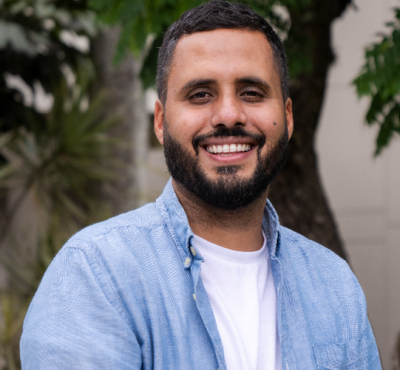
Nobel Hernández-Otero is a doctoral student at the University of Puerto Rico and a trainee with the Northeastern University SRP Center under the mentorship of Carmen Velez-Vega, Ph.D., and Phil Brown, Ph.D. For his externship, Hernández-Otero will study with Jamie DeWitt, Ph.D., a project leader with the North Carolina State University SRP Center at East Carolina University.
Hernández-Otero currently studies the effects of hazardous chemicals on pregnancy outcomes within the Puerto Rico Testsite for Exploring Contamination Threats (PROTECT) study. He also works closely with the Community Engagement Core to improve how results are reported back to study participants by making information about chemical exposures and how those exposures potentially harm health more understandable, while offering tips to reduce exposures. Through his externship, he will learn about PFAS exposure and health effects, as well as best practices of PFAS risk communication to develop an education program that will enhance how results are reported back to PROTECT participants.
“My long term goal is to understand the role of social determinants of health and exposure to hazardous substances in adverse pregnancy outcomes, particularly within in Puerto Rico, where we have a much higher rate of preterm birth than the national average," Hernández-Otero said. “Although exposure to PFAS has been associated with low birth weight and other outcomes, the presence of PFAS in pregnant women in Puerto Rico is unknown. This externship will allow me to begin addressing this need for more exploratory research while also learning how to tailor messages about PFAS to our community.”
Victoria Klaus
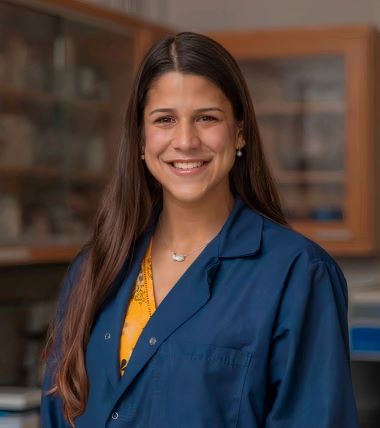
Maria Victoria Klaus is a doctoral candidate at the University of Kentucky SRP Center under the mentorship of J. Zach Hilt, Ph.D. She will travel to the Texas A&M University SRP Center to work with Timothy Phillips, Ph.D., to complete her externship.
Her current research focuses on developing advanced sorbent materials that bind to and remove per- and polyfluoroalkyl substances (PFAS) from water. Working with the Phillips lab will enable her to assess whether these materials can also be used to safely remove PFAS from the human body. She will learn techniques to study the potential toxicity and detoxification capacity of several sorbent materials to determine which are the safest and most effective.
“This opportunity will give me exposure to a new environment with new people, protocols, and procedures, and will help me become more adaptable and prepared in my future endeavors,” she said. “It will also equip me with skills to identify innovative solutions to current and future environmental and health problems plaguing our society.”
Wil Lieberman-Cribbin
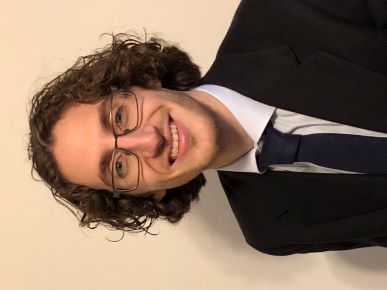
Wil Lieberman-Cribbin is a doctoral candidate with the Columbia University SRP Center under the mentorship of Center Director Ana Navas-Acien, Ph.D. Through his externship at the Yale University SRP Center, he will work with Nicole Deziel, Ph.D.
Lieberman-Cribbin studies the relationship between metal exposures in drinking water and urine and how those exposures may be associated with cardiovascular disease in Native Americans participating in the Strong Heart Study. This externship will enable him to learn new techniques that better characterize proximity to hazardous sites as additional sources of exposure and their influence on drinking water and urinary metals measurements. This new knowledge will clarify if American Indian populations have elevated concentrations of metals in both water and urine, and how hazardous sites contribute to these exposures.
“This opportunity will allow me to gain experience in field work and performing water quality assessments as well as provide the context I need to understand the data and communicate results effectively,” Lieberman-Cribbin said. “Engaging with collaborators and the research communities will deepen my training and advance my career as an independent researcher.”
Irene Martinez-Morata
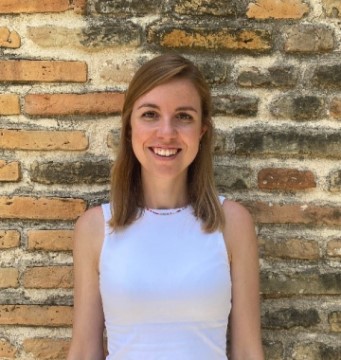
Irene Martinez-Morata, M.D., is a doctoral student at the Columbia University SRP Center under the mentorship of Center Director Ana Navas-Acien, Ph.D., and Mary Gamble, Ph.D. For her externship, she will also be mentored by Kathrin Schilling, Ph.D., at Columbia and will travel to the University of New Mexico SRP Center to work with Laurie Hudson, Ph.D., and Debra MacKenzie, Ph.D.
Martinez-Morata studies how metal exposures affect cardiometabolic outcomes. She is particularly interested in understanding how nutrition may be used as an intervention to protect health and reduce health risks. Through her externship, she will used advanced analytical approaches to identify mechanisms through which zinc supplements may reduce oxidative stress to decrease the burden of disease among communities exposed to high levels of arsenic and uranium. She will also work closely with the UNM SRP Center Community Engagement Core to develop culturally appropriate communication materials for reporting results back to study participants.
“Environmental exposures are modifiable and preventable causes of disease, which require interdisciplinary science, creativity and teamwork,” said Martinez-Morata. “I am determined to become part of the next generation of scientists that reimagines disease prevention by tackling the most urgent environmental threats to health. This externship will give me an opportunity to collaborate with diverse experts and strengthen the skills I need to pursue a career as an independent researcher.”
Sara Thomas
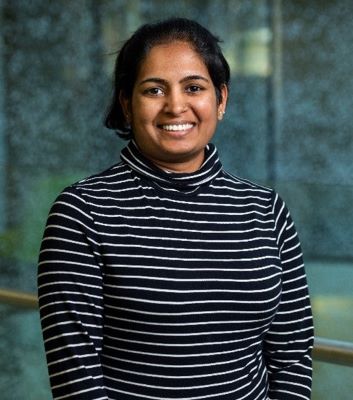
Sara Thomas, Ph.D., is a postdoctoral researcher with the Connecticut Agricultural Experimental Station (CAES) working with Jason White, Ph.D., a co-investigator on an SRP individual research project through Yale University. For her externship, Thomas will travel to Princeton University to work with individual research project leader Peter Jaffe, Ph.D.
Thomas’ research focuses on developing nanomaterials that can enhance the ability of hemp plants to take up per- and polyfluoroalkyl substances (PFAS) from soil. To address the remaining challenge of disposing of PFAS-contaminated plants, she will work with Jaffe to study the ability of microbes to break down PFAS and to assess the effect of the nanomaterials used to increase uptake on degradation efficiency.
“This externship is a tremendous opportunity for me to gain knowledge in the areas of microbiology, microbiological processes, and molecular biology,” Thomas said. “It will also advance my overall research goal of promoting a healthy and safe environment by identifying sustainable and effective methods to break down ‘forever chemicals’.”


